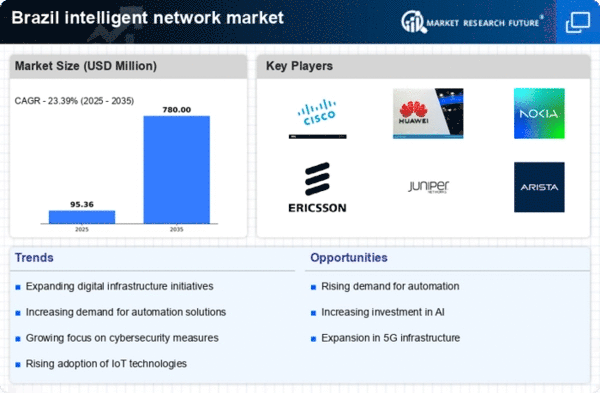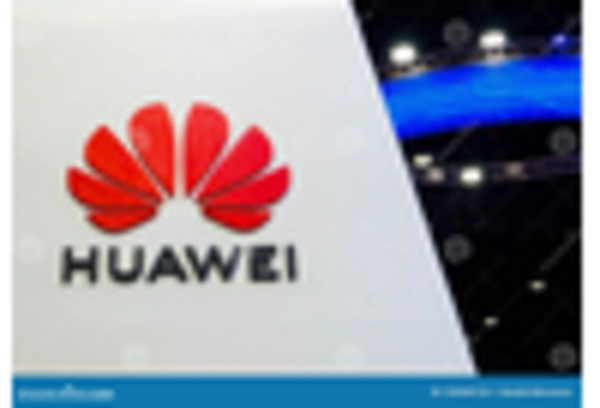Evolving Regulatory Frameworks
The evolving regulatory frameworks in Brazil play a crucial role in shaping the intelligent network market. The government has been actively promoting policies aimed at fostering digital transformation and enhancing network infrastructure. Recent regulations have focused on improving data privacy and security, which are essential for the growth of intelligent networks. For example, the implementation of the General Data Protection Law (LGPD) has prompted organizations to adopt more secure and compliant network solutions. This regulatory environment encourages investment in intelligent network technologies, as businesses seek to align with legal requirements while optimizing their operations. Furthermore, the Brazilian National Telecommunications Agency (ANATEL) has been working to facilitate the deployment of advanced network technologies, which is likely to stimulate market growth. As regulations continue to evolve, the intelligent network market is expected to adapt and thrive in response to these changes.
Integration of Smart Technologies
The integration of smart technologies into various sectors significantly influences the intelligent network market in Brazil. Industries such as healthcare, manufacturing, and transportation are increasingly adopting smart solutions to enhance operational efficiency and improve service delivery. For instance, the healthcare sector is leveraging intelligent networks to facilitate telemedicine and remote patient monitoring, which are becoming essential in urban and rural areas alike. The Brazilian government has allocated approximately $1 billion for smart city initiatives, which include the deployment of intelligent networks to support urban infrastructure. This investment is expected to catalyze the growth of the intelligent network market as more sectors recognize the benefits of integrating smart technologies into their operations. As a result, the market is likely to witness a robust expansion driven by the demand for innovative solutions that enhance productivity and connectivity.
Rising Demand for Enhanced Connectivity
The intelligent network market in Brazil experiences a notable surge in demand for enhanced connectivity solutions. As businesses and consumers increasingly rely on seamless internet access, the need for intelligent networks that can manage and optimize data traffic becomes paramount. According to recent data, the number of internet users in Brazil has reached approximately 150 million, representing a penetration rate of around 70%. This growing user base drives the necessity for advanced network solutions that can support high-speed connections and reduce latency. Furthermore, the proliferation of IoT devices, projected to exceed 1 billion by 2025, necessitates intelligent networks capable of handling vast amounts of data. Consequently, the intelligent network market is poised for substantial growth as organizations seek to implement robust connectivity solutions to meet these evolving demands.
Growing Focus on Data Analytics and Management
The growing focus on data analytics and management is reshaping the intelligent network market in Brazil. Organizations are increasingly recognizing the value of data-driven decision-making, which necessitates the implementation of intelligent networks capable of processing and analyzing vast amounts of information. The market for data analytics solutions in Brazil is projected to grow at a CAGR of approximately 25% over the next five years. This trend indicates a strong demand for intelligent networks that can support advanced analytics capabilities, enabling businesses to derive actionable insights from their data. Moreover, as companies strive to enhance customer experiences and optimize operations, the need for intelligent networks that facilitate real-time data management becomes critical. Consequently, the intelligent network market is likely to expand as organizations invest in technologies that enable effective data analytics and management.
Increased Investment in Telecommunications Infrastructure
In Brazil, increased investment in telecommunications infrastructure significantly impacts the intelligent network market. The government and private sector are channeling substantial resources into upgrading existing networks and expanding coverage, particularly in underserved regions. Recent reports indicate that investments in telecommunications infrastructure are projected to reach approximately $20 billion by 2026. This influx of capital is likely to enhance the capabilities of intelligent networks, enabling them to support higher data speeds and improved reliability. Additionally, the expansion of 5G technology is set to revolutionize the intelligent network market, providing unprecedented opportunities for innovation and connectivity. As telecommunications infrastructure continues to evolve, the intelligent network market is expected to benefit from enhanced performance and increased adoption across various sectors.
















